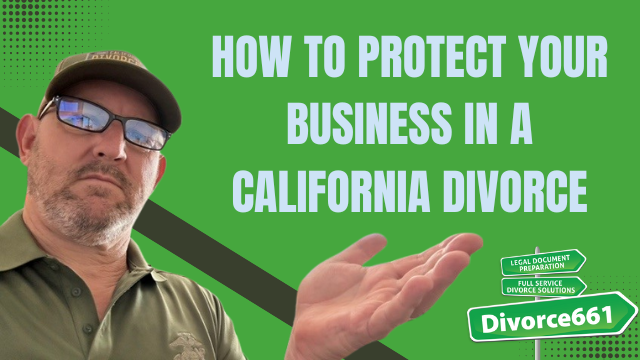How to Protect Your Business in a California Divorce
In a short, practical video, Tim Blankenship of Divorce661 explains a crucial point for business owners facing divorce in California: even if your spouse’s name isn’t on your business, part—or even all—of its value can be considered community property. This article walks through how California law treats businesses in divorce, real-world strategies to protect your company, and the steps you should take now to safeguard what you’ve built.
Why your business might be community property
California is a community property state. That means assets acquired or substantially increased in value during the marriage can be subject to division between spouses. For business owners, that raises two key possibilities:
- If the business was started during the marriage, it is typically considered community property.
- If the business existed before marriage but grew or was enhanced during the marriage, the marital contribution to that growth may be treated as community property.
Even if your spouse is not on business documents or bank accounts, their legal right to a share of the business’s community portion still exists. Understanding this reality early can help you plan and protect your interests.
Real case example: start-before-marriage, grow-during-marriage
Here’s a real scenario we handled at Divorce661: a client started a consulting firm before marriage but significantly grew the business during the marriage. The outcome hinged on two things:
- Engaging a business valuation expert to determine how much of the company’s value was attributable to marital efforts and contributions.
- Negotiating a settlement that fairly compensated the non-owner spouse for the community portion while allowing the owner to retain control of the company.
The valuation expert assessed the business’s pre-marriage baseline value and isolated the increase during the marriage. Using that analysis, we crafted an agreement that honored both fairness and the owner’s desire to keep operating the business.
How business valuation works in divorce
A reliable valuation is the linchpin of any business-related divorce settlement. Valuation experts look at:
- Value of the business prior to marriage (separate property baseline)
- Growth, goodwill, and increased revenue attributable to marital efforts
- Capital contributions from community funds vs. separate funds
- Future earning potential and intangible value created during the marriage
From there, the expert determines the percentage of total value that represents community property. That figure becomes the base for settlement negotiations or court allocation.
Practical strategies to protect your business
While no strategy guarantees an outcome, several practical steps can significantly reduce risk and make division smoother.
1. Separate personal and business finances
- Keep business accounts, payroll, and expenses distinct from personal accounts.
- Avoid using marital funds to capitalize the business without documenting the source and intent.
2. Keep detailed records and documentation
- Document when the business started, initial investments, and all capital infusions during the marriage.
- Track business growth drivers—clients won, contracts signed, and hours worked that increased value.
3. Use agreements to define ownership and expectations
- Consider prenuptial or postnuptial agreements that clearly allocate business interests.
- Implement shareholder or member agreements, buy-sell agreements, and employment contracts that define compensation and succession.
- When divorce occurs, negotiate settlement agreements that allow the owner to retain the business while fairly compensating the other spouse.
4. Provide clear and timely disclosures
Full transparency around business finances and valuations is essential. Proper disclosures protect your credibility, prevent litigation surprises, and support fair settlements.
“It’s about securing what you’ve built with foresight and fairness.”
Why you need professional help
Business division in divorce involves legal, tax, and valuation complexities. The right team makes the difference:
- Family law attorneys who understand business issues and settlement drafting
- Certified valuation experts who can separate separate from community value
- Accountants or forensic accountants who trace funds and document contributions
At Divorce661, we focus on practical solutions for business owners: separating personal and business finances, coordinating court-ready settlement agreements, and working with valuation experts to reach fair outcomes. Our flat-fee divorce services across California aim to be fast, affordable, and less stressful.
Next steps you can take today
- Inventory and organize business and personal financial records.
- Schedule a consultation with an attorney experienced in business/divorce matters.
- Consider hiring a valuation expert early if your business grew during the marriage.
- Create or review business agreements (operating agreements, buy-sell documents, prenups/postnups).
If you own a business and are facing divorce in California, don’t wait until settlement negotiations begin. Early planning and the right experts can protect both your company and your peace of mind.
Final thoughts and how we can help
California’s community property rules mean business ownership can be complicated in divorce—but there are clear, proven ways to manage that risk. Separating finances, documenting contributions, getting a solid valuation, and crafting fair agreements are all part of a smart strategy.
If you want help navigating this process, schedule a free consultation with Divorce661. We’ll review your options and help you protect the business you’ve worked hard to build.

